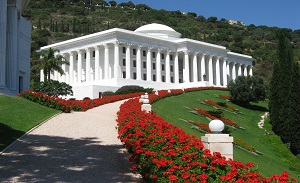Origins of the Universal House of Justice
Origins of the Universal House of Justice
 The institution of the Universal House of Justice was ordained by Bahá’u’lláh in His Most Holy Book, the Kitáb-i-Aqdas. Its responsibilities were also expanded upon in a number of His other Writings. ‘Abdu’l-Bahá confirmed the authority of the Universal House of Justice in His Will and Testament and provided specific details regarding its establishment and functioning.
The institution of the Universal House of Justice was ordained by Bahá’u’lláh in His Most Holy Book, the Kitáb-i-Aqdas. Its responsibilities were also expanded upon in a number of His other Writings. ‘Abdu’l-Bahá confirmed the authority of the Universal House of Justice in His Will and Testament and provided specific details regarding its establishment and functioning.
In the early years of the 20th century, during a period when His life was in particular danger, ‘Abdu’l-Bahá took measures to arrange for the election of the Universal House of Justice should something happen to Him. This precaution did not turn out to be necessary.
After ‘Abdu’l-Bahá’s passing, Shoghi Effendi—the Guardian of the Bahá’í Faith—placed the greatest importance on the establishment of the Universal House of Justice. He devoted more than three decades to preparing the Bahá’í world community for its election, repeatedly looking ahead to that auspicious occasion in glowing terms. It was first necessary, however, to raise up and strengthen the global network of Local and National Bahá’í Assemblies to provide a strong basis for such an entity. Every new National Spiritual Assembly that was formed became one more pillar to “share in sustaining the weight and in broadening the foundation of the Universal House of Justice.”1
In 1951, Shoghi Effendi appointed a number of individuals to an International Bahá’í Council, a forerunner to the Universal House of Justice. In 1961, this appointed Council was reformed as a body elected by all the National and Regional Assemblies then established in the world.
After Shoghi Effendi’s sudden passing in 1957, his work was faithfully carried on by the group of distinguished Bahá’ís he had appointed as Hands of the Cause of God. These individuals arranged for the first election of the Universal House of Justice.
In April 1963—the centenary of the public declaration of Bahá’u’lláh—the Universal House of Justice was elected by all 56 National Spiritual Assemblies that were by then established in the world. The International Bahá’í Council ceased to exist with the election of the Universal House of Justice.
The coming into being of the Universal House of Justice was a tremendously significant event. After more than a century of expansion and consolidation—and through a democratic global electoral process—the Bahá’ís of the world were able to bring into existence the permanent international institution, ordained by Bahá’u’lláh, to guide its affairs.
Since its formation, the Universal House of Justice has devoted more than half a century to building and consolidating a Bahá’í community which has the resources and capabilities to participate in the establishment of the global civilization envisaged by Bahá’u’lláh, through a process of applying His teachings to the betterment of the world.
To support it in its work, the Universal House of Justice has, furthermore, created a number of appointed institutions; among these are the Continental Boards of Counsellors and the International Teaching Centre.
As stipulated by Bahá’u’lláh, the Seat of the Universal House of Justice is located on Mount Carmel in the Holy Land, in close proximity to the Shrine of the Báb.
Source: universalhouseofjustice.bahai.org/
